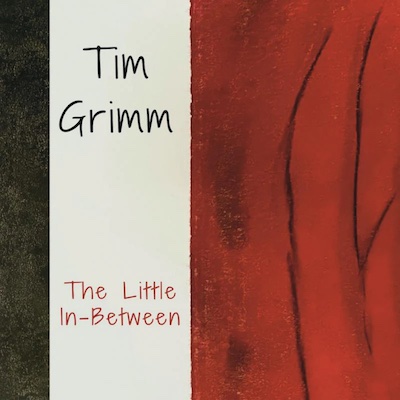Tim Grimm
The Little In-Between
Cavalier Recordings
14 April 2023

Drawing on his life on the rural farm he built in Indiana, including family, tradition and community issues, Tim Grimm charts a more internal and personal landscape on his new album, The Little In-Between. Written in Oklahoma, his first not to be recorded in his home state and the first not to feature harmonies. The sound is fleshed out by the rhythm sections of Mark Clark and Justin Bransford, guitarist Sergio Webb and Scottish cellist Alice Allen.
Via a meditation on loss and grief, the often enigmatic songs (illustrated by his charcoal and pastels illustrations) trace a literal journey from the hills of Southern Indiana to the Oklahoma prairie and an abstract one from the past to an unknown future, via the spaces in-between.
It opens with the fingerpicked, cello pulsing The Leaving, recalling how “I split that wood I stocked it too/Like, my Father”, before setting out on the journey to find peace, heading into Lonesome All The Time which, namechecking earlier songs Better Days and The Perfect Getaway, has a jauntier Hank and Woody-folksiness and pedal steel spring that somewhat belies lyrics like “I have known you for so long, we have sung so many songs/ We have made so many plans, we have tried the best we can/Our boys are up and grown, now the dove of love has flown” as it laments the loss of a farm, marriage and the loneliness of the road.
Slowly strummed with Prine echoes, I Don’t Know This World is another lyrically downcast number about feeling lost (“I thought I knew the road ahead/But I missed a curve”), rejected (“I don’t know these people/Who won’t look Me in the eye/I used to tell their stories/Now they say it’s only lies”) and alone (“There’s no one there tonight/ Inside a house that was a home”) where it’s hard not to assume he’s writing about a world that’s fallen apart (“The hands that used to reach for you/Are covered in barbed wire/And the tongue that held your secrets/Is angry and on fire”) and trying to adjust to a new one.
Stirrin’ Up Trouble has an itchier groove and lyrics that seem to speak to the media-driven social and political unrest that’s divided America and those that can’t mind their own business (“They got the cartoons, we’ve got the facts/They got the wooden spoon, I’ve got the axe”), switching back to a simple acoustic fingerpicked sound for the piercingly sad The Breath Of Burning, as he imagines staring through the window of his former home (“And now it’s cold as cold can be/As cold as hearts left all alone/Like ice that covers trees/You wonder how, how can this be/Can all of this be not enough/This home, this family/And there it goes, it starts to fly/ A thousand pieces of your heart/ Are broken in the sky”), Allen’s cello swelling the emotion embedded in lines like “The hardest part of losing things/Is knowing when they’re gone”.
Musically reminding me of John Stewart with its steady walking rhythm, the title track, which references how his mother and father met, is about that moment of stasis before things resolve one way or another, “Between salvation and being torn asunder”. His father is also the subject of the circlingly picked Van Zandt-flavoured New Boots, one of the finest songs Grimm’s written, which, in recalling how he never wore the new boots he was given preferring to make do with the old but trusted (“He said that holdin’ onto old things was like holdin’ onto time”), is a paean to the dignity of a make do, don’t make a fuss mentality (“My Father wore his boots like my Father wore his clothes/ My Mother mended rips and my Mother patched the holes/ My Father had his Father’s tools- simple, strong, and steel/My Father seldom hugged me, but I’d know just how he’d feel”).
It comes to a close with, first, Twenty Years Of Shadows, an opaque song that, referencing Dylan’s Subterranean Homesick Blues, strikes as a feeling of being lost and apart (“sometimes your boots/They touched the ground/Sometimes they walked a dream/But neither got you closer/To the man that you had seen”). Referencing Brown Mountain in North Carolina and laden with wistful memories (“The year you cut your hair I’d always kiss your neck/ And run my fingers there/And try not to forget/That I would surely lose you For such a long, long time”), he describes as about how decades of a hidden (perhaps forbidden) love (“Twenty years of shadows/Lookin’ for your light/On the streets of Chicago/Walking day and night… We stood there side by side/ We walked the stage together In perfect stride-to-stride …And though we had the gift To read each other’s minds/Our lips were always sealed/And our hands were always tied”) are finally brought out into the light of belonging in the settled warmth of the final verse (“You have the old blue dresser /With the fresh coat of paint/you have the Irish necklace/That you wear most days…You have my old plaid shirt/ You wear day and night …I’m on my way”).
Finally comes the optimism of the gravelly sung, simple Kristofferson-styled troubadour folk of Bigger Than The Sky with its simple declaration that “There is love not far behind us/There is love, there is love just up ahead/ It’s a mystery that always seems to find us/ Sometimes we just can’t help but jumpin’ in’ There is love for our friends and for our family/It’s a love too big to deny/For the critters and the trees and empty gardens/It’s a love that’s bigger than the sky”.
Whatever ghosts of the past feel put to rest on an album that, journeying inward in order to embrace the here and now, again marks Grimm as one of America’s finest songwriters.
Website: https://timgrimm.com/
